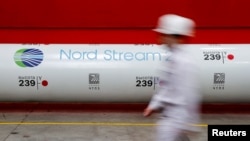The U.S. will waive sanctions against the German company leading construction of the Nord Stream 2 pipeline, according to a State Department report sent to Congress on Wednesday.
The report noted that while the German firm Nord Stream 2 AG and its CEO had violated U.S. law in their work with Russia to build the natural gas pipeline linking the two countries, it was in U.S. national interest to waive the sanctions.
The report noted that sanctions would be imposed on several Russian ships and companies for their work on the project.
Russia and some U.S. lawmakers reacted to the decision before it was officially announced. Axios first reported that the waiver was impending on Tuesday.
Nord Stream 2 is a multibillion-dollar underwater gas pipeline project linking Russia to Germany. Work on the pipeline was suspended in December 2019 after it became a source of contention between Russia and the West.
Nord Stream officials said Russia resumed construction on the gas pipeline in December. The United States has opposed the joint international project because of possible threats to Europe's energy security. Nord Stream 2 is intended to double the annual gas capacity of an existing Nord Stream pipeline.
In a statement Wednesday, U.S. Senator Jim Risch, a ranking member of the Senate Foreign Relations Committee, called the decision wrong and contradictory.
"The administration seems to be suggesting it is somehow in the United States' best interest to allow this Russian malign influence project to be completed," the statement said.
Secretary of State Anthony Blinken said in his confirmation hearing earlier this year that he was "determined to do whatever we can to prevent that completion."
The Biden administration has placed increased sanctions on many Russian officials, particularly after the arrest of opposition leader Alexey Navalny. But when asked about the pipeline last month, Biden called it a "complicated" issue that was "still in play."
The Kremlin responded to the Axios report before the official announcement, calling it a "positive signal."
"The appearance of such publications is quite positive in itself," Kremlin spokesperson Dmitry Peskov told reporters on a conference call. "It's much better than reading that new sanctions are on their way."







